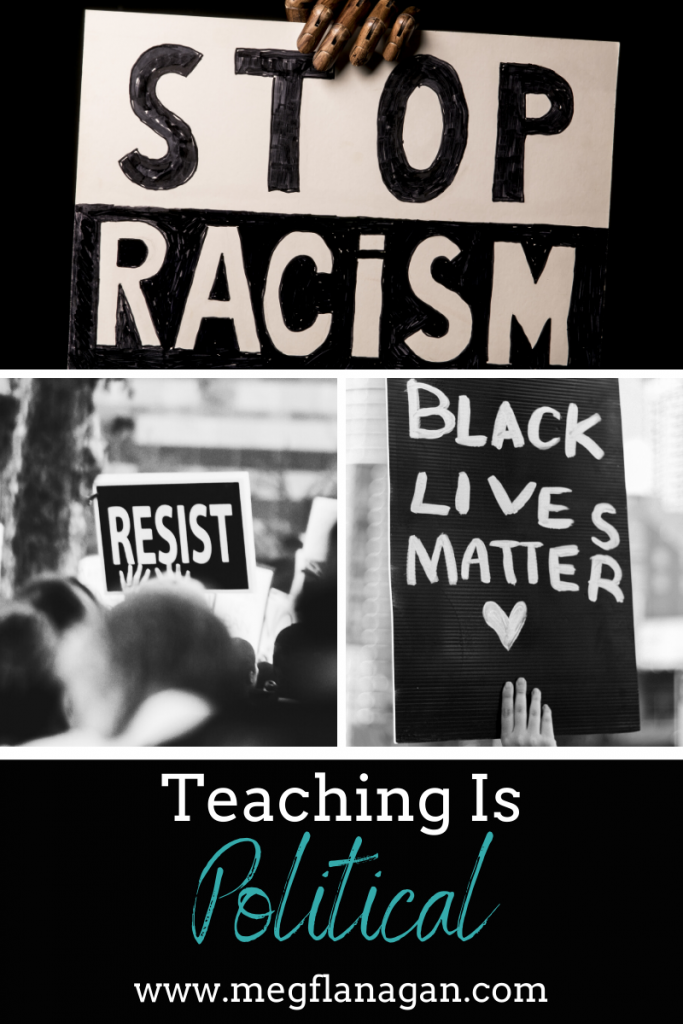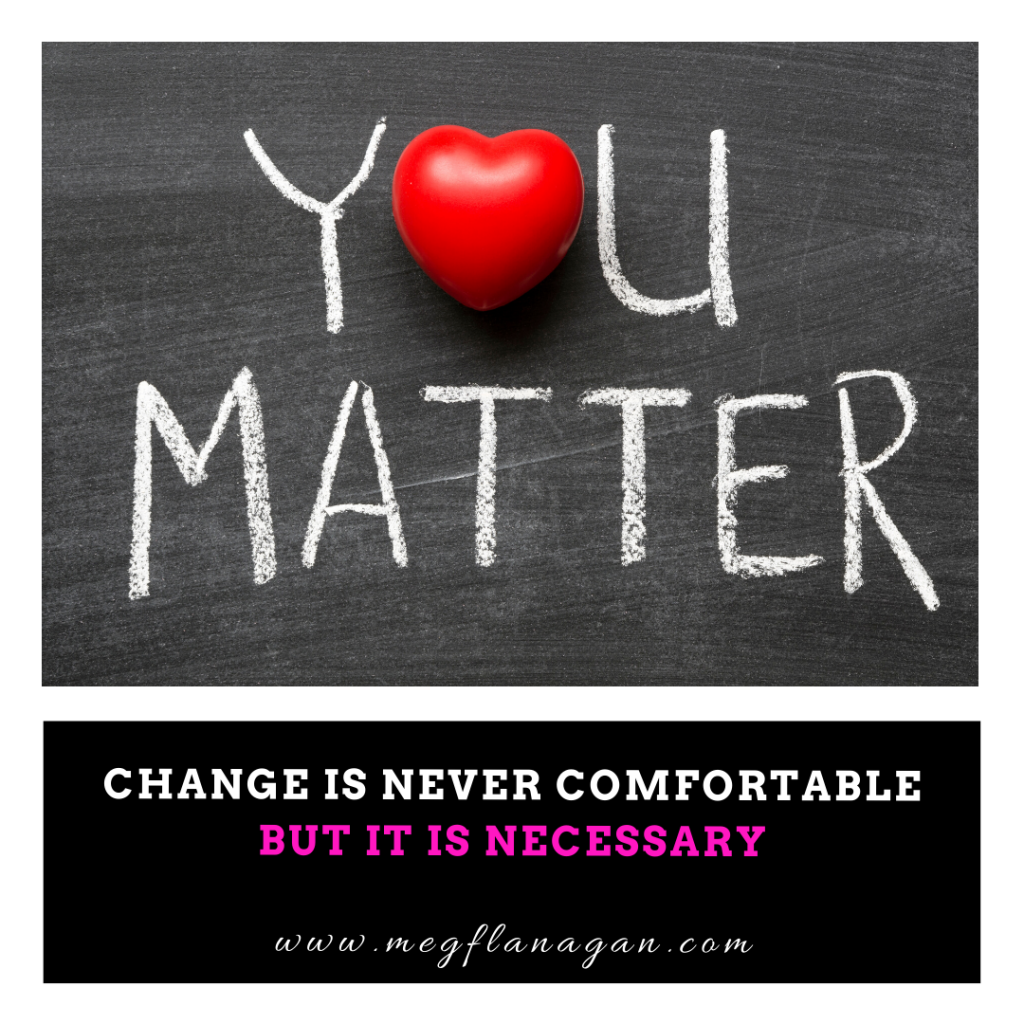Over the last week or so, I have been sitting with my thoughts. I have been watching the largely peaceful protests unfold around the country. My kids and I have been talking about racism and how we can show up bigger for our communities with love for justice.
Something that a fellow teacher shared on social media struck a chord.
Teaching IS Political Action
To that, I’m going to add that advocacy work – the kind I do with individual families working for equitable access to school AND the kind we should all be doing for big systemic changes to improve equity for all – is political.

I’m not talking about right or left, conservative or liberal, Democrat or Republican. It’s about REAL gritty, grass-roots politics. The kind we can all support on our quest for a better tomorrow.
Sharing Facts is Political Action
In our current world of fake news and the undercutting of the First Amendment by the highest political office in the land, just sharing verifiable facts is political action.
We cannot do better until we know better, to paraphrase the great Maya Angelou. But to know better means that we must, without question, have access to the hard, cold facts. We need to know the facts even if, especially if, they make us deeply comfortable.

Fact: the first Black slave was brought to the English colony of Jamestown in 1619. The LAST slave was emancipated, following a bloody civil war, in 1865.
Read more about Jamestown and American slavery in The 1619 Project from the New York Times
Fact: even after the US duked it out in a literal war, whites created systems and laws that disenfranchised Black Americans categorically. Literacy tests, poll taxes, “whites only” signs all over the place. That all happened and was allowed to happen by whites who actively participated AND who turned a blind eye.
Learn more about Jim Crow laws at History.com
Fact: Black Americans still experience discrimination today, like being refused service in restaurants or turned down for mortgages and loans that they otherwise qualify for.
Read more about modern day racial discrimination from the Pew Center
To do better, to make attempts to fix the system, we have to confront the truth of the system.
Teachers are the First Line of Facts
I’ve been a teacher for over a decade. I am also a cisgender, white woman. I have benefited from my privilege in ways that I do not even know about, honestly.
What I can do is expose my students to the hard, cold facts.
It’s something that ALL teachers can and should be doing regularly.
It’s tempting to gloss over the ugly parts of America, to pretty it up. Here’s where we might fall into that trap:
- avoiding the hard talk about the true cause of the Civil War – that some states wanted to retain the right to enslave a group of people based on the color of their skin while other states wanted to end that practice
- making the Civil Rights Movement into a series of palatable quotes from Dr. King while ignoring the violence and grittiness of the reality, ignoring the police brutality
- to make Ruby Bridges into a Hallmark movie and picture book while failing to mention that this is a woman who is still alive TODAY
- ignoring the fact that some states celebrate holidays to commemorate Confederate leaders – you know, the traitors to the Constitution
- forgetting to mention the Tuskegee experiments that infected Black “subjects” with syphilis without their knowledge or consent
- saying that Native Americans “moved” west instead of telling the truth – that white Americans pushed and shoved them off ancestral lands, killing untold numbers along the way with starvation and disease
- talking about the injustice of the German concentration camps but forgetting to mention that the US systematically imprisoned Japanese Americans in our own concentration camps
There are infinite ways that white America has glossed over the injustices done to minorities in our country, ways that we have failed to live up to the fullest and best ideals of our nation.
As teachers, it is our job to share these facts, uncomfortable though they might be, with our students. We must do this unflinchingly and with clear hearts.
Real change, grass roots change, starts with us and with teaching the next generation to be better, to know better, to do better. To live up to our American promises of equality under the law for all.
Advocacy is Political Action
Part of that American promise the equitable access to a free appropriate public education (FAPE) for all students. However, just because it’s what the law, specifically IDEA 2004 and Section 504 of the ADA, demands doesn’t mean that it happens for all students, all the time.
That lack of legal follow through is why I am an advocate for all students and families.
I have seen students, children, bullied based on the color of their skin or national origin. I have witnessed parents fight for years to get something, anything to help their child learn. And I have seen passionate teachers, trying to advocate for their students, be shutdown with racially-connected remarks – blaming a student’s failure to make progress on the fact that they were recent immigrants, came from a poor family, or were learning English as a second language.

Being on a team, working with parents, to ensure that a child actually receives the education to which they are legally entitled is incredibly fulfilling.
But doing the 1:1 advocacy is only part of the work. So many are also working hard to change laws and practices around the country to better serve all students.
Teaching & Advocacy Require Uncomfortable Confrontation with the Truth
Having had hard conversations with kids, ages 6-10, about race, history, and racism I can tell you that it is not easy. It is not fun or cozy to talk about all the ways in which white folks have discriminated against perceived “others” in our country.
But we need to have this awareness and grow our understanding.
True change isn’t ever easy or fun or comfy. It’s hard and painful and scarring.
If change were easy, everyone would do it. To change requires us to confront the truth, about ourselves and our country, head on.
I’m not claiming to understand or know everything about discrimination. My biological gender, sexual orientation, and skin color affords me the privilege of living life without needing to make those daily calculations or confront the system.
However, my privilege also gives me a powerful way to help and support those who ARE living it daily.
- I can acknowledge my privilege in society; this is different than saying I had it “easy” or that I didn’t work – it just means that the way I look, the abilities of my body, and my sexual orientation didn’t provide additional barriers
- I can speak up when I hear, see, or read someone using white privilege to suppress and oppress others
- I can continue to educate myself about race, racism, and American history from different perspective while also stepping back from the conversation to let those with experience lead the way
Today, and always, we affirm that Black Lives Matter.
